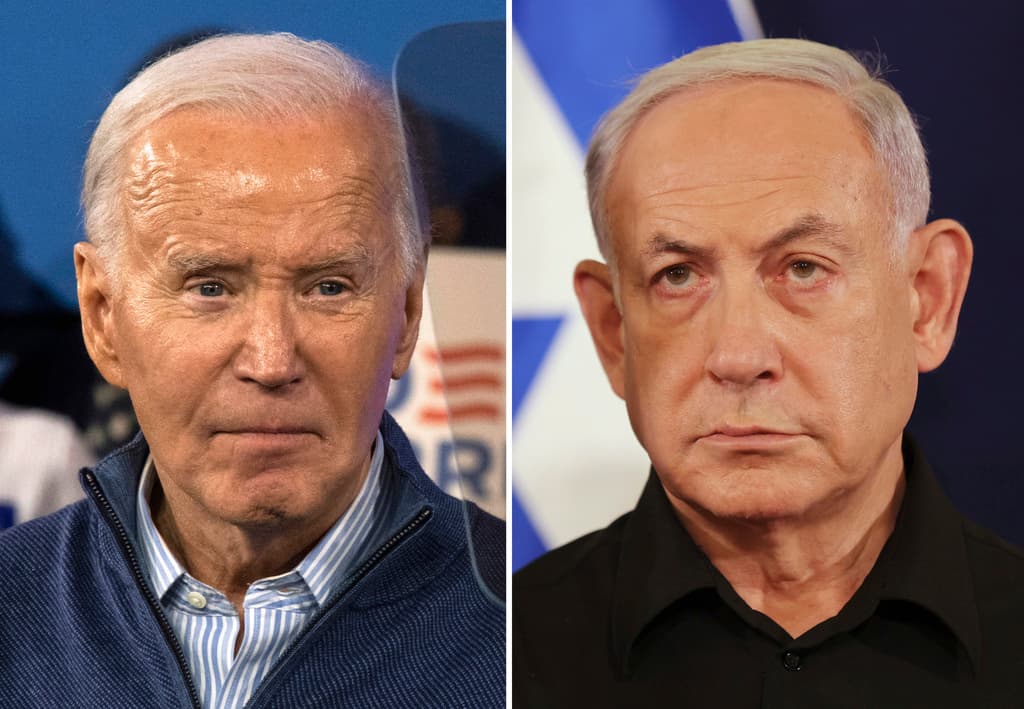Netanyahu Sees Lebanon Cease-Fire as Chance To Focus on Iran Threat, While Biden Focuses on Possibility of Mideast Peace
Netanyahu indicates that he expects the incoming Trump administration to refrain from micromanaging Israel’s war tactics, including by providing arms it needs.

Prime Minister Netanyahu is hinting at future Israeli strikes against Iran, claiming that a cease-fire in Lebanon, as well as the coming leadership change at Washington, will facilitate his top strategic goal: preventing Tehran from becoming a nuclear power.
While Mr. Netanyahu said the just-approved 60-day cease-fire deal with Lebanon would allow Israel to defeat the enemies it is facing on seven fronts, as well as their sponsor, the Islamic Republic of Iran, President Biden portrayed the deal as a first step toward Mideast-wide peace.
“Now Israel must be bold in turning tactical gains against Iran and its proxies into a coherent strategy that secures Israel’s long term safety and advances a broader peace and prosperity in the region,” Mr. Biden said shortly after the Jerusalem cabinet approved the deal. He added that Hamas must now free the hostages and end the war in Gaza as a well.
The 60-day cease-fire agreement in Lebanon, expected to take effect Wednesday morning, was negotiated by Mr. Biden’s envoy, Amos Hochstein, with the government of Lebanon, and was tacitly approved by Hezbollah.
Israel is accepting a deal to end the current round of hostilities with Hezbollah so it can concentrate on the region’s other strategic threat, and especially Iran, Mr. Netanyahu said in Hebrew during a prime-time televised address.
“My first reason is to focus on the Iranian issue,” Mr. Netanyahu said, adding, “I will not expand on that.” Another reason is the need to refresh the troops and replenish arms.
“It is no secret,” he said. “There are delays, major delays, in arms deliveries” from America. “And this hold-up will end soon. We will receive advanced weapons to protect the lives of our troops and to add capabilities for completing our missions.”
In an effort to convince Mr. Netanayhu to sign on to the Lebanon deal, Washington reportedly promised to release its hold on several congressionally approved weapon systems. Israel says the administration has delayed deliveries of arms due to perceived human rights violations in Gaza.
Mr. Netanyahu indicated that the incoming Trump administration would refrain from micromanaging Israel’s war tactics, including by providing arms it needs. Weapons known as bunker busters, which could penetrate deeply dug Iranian nuclear facilities, could be among those on offer.
“I am determined to do all that is needed to prevent Iran from obtaining nuclear arms,” Mr. Netanyahu said. “This threat is always at the top of my agenda, and especially now, when you hear repeated statements from Iranian leaders that they intend to acquire nuclear weapons. For me, the removal of this threat is the most important task to ensure the future of the state of Israel.”
As Mr. Netanyahu spoke, residents of northern Israel protested against the American-sponsored cease-fire in Lebanon. They argued that the pact would allow Hezbollah to soon return to Lebanese villages near the border, where the Israel Defense Force has in recent months demolished tunnels and arms depots.
“Let me be clear,” Mr. Biden said. “If Hezbollah or anyone else breaks the deal and poses a direct threat to Israel … Israel retains the right to self defense consistent with international law.”
The new deal reportedly contains a side letter in which America affirms Israel’s right to act militarily each time it sees a violation, such as a ratcheting up of drone attacks from Lebanon, attempts to rearm Hezbollah, or the return of fighting forces or rocket launchers to the border area.
Mr. Netanyahu vowed to renew hostilities if any violation occurs. Yet, the government of Lebanon is not a party to the American-Israeli side deal. The rest of the Arab world and several European countries are unlikely to accept Israel’s right to act.
On Tuesday IDF troops for the first time reached the Litani River, some 20 miles away from the border. According to a 2006 United Nations Security Council resolution, the area south of that river should be free of Hezbollah fighters. Yet, in the last 18 years, it has turned it into a fortified base from which to attack Israel.
“Hezbollah chose to attack us on October 8” of last year, Mr. Netanyahu said, but now “this is not the same Hezbollah. We turned it back decades. We eliminated Nasrallah and the entire senior command. We destroyed most of the missiles and rocket arsenal. We killed thousands of terrorists and demolished the underground terror underground near our borders, which have been built for years.”
Even as Mr. Netanyahu spoke, the Israeli air force struck multiple targets at the Dahia district of Beirut, a Hezbollah stronghold. “The earth at Beirut is shaking,” Mr. Netanyahu said. At the same time, Israelis living in the north and all the way down to the country’s third-largest city, Haifa, were in danger after several exploding drones infiltrated Israeli air space.

